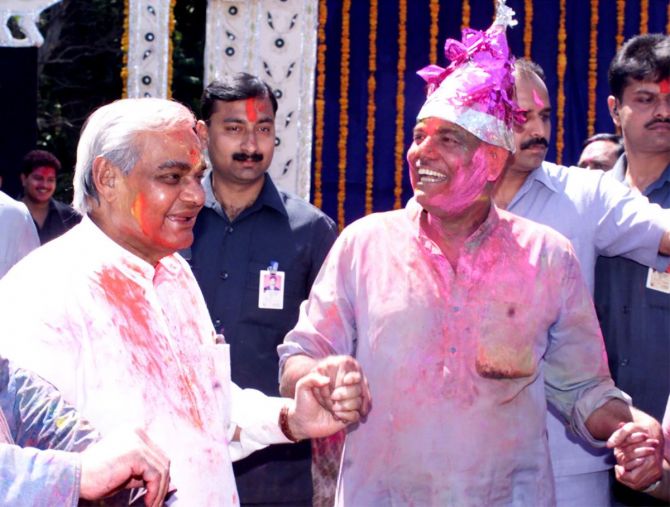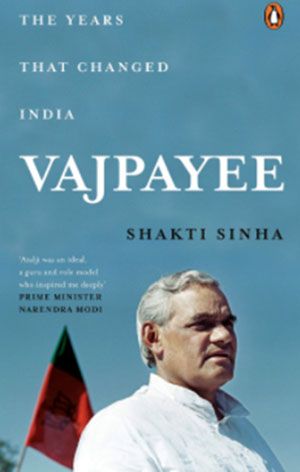'Mr Vajpayee felt that you could pray to any god or not pray at all, but the country comes first.'

"He believed that despite our differences, the country is one in terms of its larger cultural and civilisational background," says Shakti Sinha, the IAS officer who served as private secretary to then prime minister Atal Bihari Vajpayee.
In the concluding segment of his interview with Rediff.com's Archana Masih,, Sinha -- author of the fascinating Vajpayee: The Years That Changed India -- discusses the challenges faced by Mr Vajpayee when his government was skating on thin ice and how he confronted the pressures of his office with infinite patience.
What do you think are the differences between Mr Vajpayee and Mr Modi as politicians and prime ministers?
Mr Vajpayee was born in 1924, the present prime minister is born in independent India in 1950.
One saw his party as being beyond the pale, not acceptable, extremist while the other saw it far more central to Indian politics and with greater acceptability.
Their experiences within the RSS and as workers of the party were different. Vajpayee was never a field worker of the Jan Sangh, he started life at the headquarter with Syama Prasad Mukherjee (the founder of the Bharatiya Jan Sangh). So both their political experiences were very different.
Mr Modi spent 12 years as a successful chief minister, while Mr Vajpayee had no administrative experience at the state level and spent all his life in Parliament or near Parliament.
But in their larger worldview of a stronger, India they are both the same.

Do you think Mr Vajpayee would have achieved much more had he not been held back with the differences and tugs with the RSS and Mr Advani?
I am not sure. He would not be prime minister but for the Sangh and the BJP. His popularity was bigger than the party, but could he have done it without the party and the Sangh? The answer is no.
As a member of a political party with an ideology you have to accept the whole package deal. I don't think there were such differences either with Advaniji or the Sangh that were irreconcilable.
Yes, they disagreed on many things as two people would, but in the long run they were reconcilable and it was a dynamic situation, not a static one.
If you look at my explanation for the loss of the 2004 (Lok Sabha) election, I say clearly that the change of alliance [from DMK to AIADMK] in Tamil Nadu brought the BJP down from 40 seats to 0.
In Andhra, we came down from 36 to 6, UP and Bihar 20 seats -- that's around 100 seats.
If we had won those seats nobody would have talked about the differences with Advaniji and the RSS.
In none of these 4 states, those differences had any role to play. I don't think that argument has full validity.
What was the quintessence of Mr Vajpayee's Hindu worldview?
The belief in the motherland.
I cite a case where Mr Vajpayee was clear that the RSS was banned wrongly after Mahatma Gandhi's death by Sardar (Vallabhbhai) Patel. Vajpayee said that even though he felt Sardar Patel had been unjust to the Jan Sangh, he respected him because Sardar Patel did so much for the country.
Vajpayee placed the country above the party. He was loyal to the country. He felt once you have that, you can pray to any god or not pray at all, but the country comes first.
He believed that despite our differences, over all the country is one in terms of its larger cultural and civilisational background.

Was Vajpayee's politics spontaneous from the heart or calculated from the mind?
I speak now as a student of modern Indian history, not as somebody who spent some time with Vajpayee.
I can't say what was in his mind, but I would think that it was definitely also from the heart.
If you read some of his poetry you find that he was extremely bitter about Partition. He felt that the division of the country over religion was wrong and that we were only half free.
He also wrote that we had become free after a thousand years of subjugation. He had a very strong love for the country.
His politics was calculated because politics is the art of the possible. You have to mindful of being in the real world. You have to temper your desires to see what fits in the contemporary world, and yet within that try to push the envelope so that what you think is acceptable to others also.
It's a balance of the heart and the head.
As a student of contemporary India, I think two of the most under-rated politicians were Vajpayee and Nehru. Both were thought to be larger than life, statesmen and idealists and both had to face a lot of politics.
I don't agree with Nehru's politics at all, but he was able to make his politics the centre of the Congress party after Patel's death and then become the centre of Indian politics and Indian society.
Similarly with Vajpayee, he saw an ideology that was seen beyond the pale, not acceptable and extremist become the centre of politics in his own lifetime.
The BJP since 1996 did become the fulcrum of Indian politics.

Can you give us a little sense of what Mr Vajpayee was like behind the prime minister?
My book is about contemporary history and I have stayed clear of his likes and dislikes, but yes, I have mentioned his love for poetry, literature and food.
He liked reading and was very up to date on the news and read the papers very carefully. As prime minister he had very little time to do relaxed reading. He was politically very charged.
He could play with words which came from his depth of knowledge of Hindi literature. He also had a fair knowledge of Marathi literature.
What were your personal learnings of those years as his personal secretary?
It made me understand that decision making is far more tougher than I thought.
I had once said during an event at the Nehru Memorial where Mr Arun Jaitley was present that the two most difficult jobs in India are those of the Indian cricket captain and the finance minister. Other than the two of them, the world knows what they should be doing!
I understood that decision making is far too complex because there are too many unintended consequences. One can never base a decision on complete information because there is never enough time to collect information and people under pressure.
It also made me realise that we underate politicians. It would help the country if the educated Indian society was more engaged with politics, instead of abusing them all the time.
Politicians reflect the churn in society.
Mr Vajpayee dealt with all these pressures with an infinite amount of patience. It made me realise that there is much more to politics than what meets the eye and ultimately Indian politicians have helped the country much more than we give them credit for.
Feature Presentation: Aslam Hunani/Rediff.com










